 |
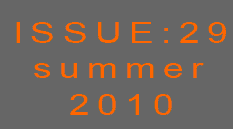 |
|
|
important roles that nuclear industry must play is to motivate young and well-qualified people to work in nuclear research, as well as to promote job opportunities for them in the nuclear sector. After his speech, representatives of some of the leading companies presented a plenary session about current technologies being developed. At the end of the plenary session, Livio Vido, from ENEL, |
 |
explained the current energy situation in Italy, stressing that: “Plans are in place for the construction of eight reactors in Italy in the coming years.”
During the conference many interesting projects were presented thanks to the large number of sessions, which focused on the following research areas: new reactor and energy technologies, the nuclear fuel cycle, medical applications, education and training and socio-economic, political and ethical considerations. Also more than four hundred posters were exhibited in the Palau’s exhibition halls.
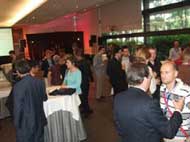 On Monday night, the ENS Young Generation Network (YGN) organised an informal dinner for all the young specialists present at the conference. It was an opportunity for them to get to know people from all over the world who are working in the nuclear field. During the dinner, the Jan Runermark Award (which is awarded annually at ENC2010 in memory of the former President of ENS and founder of the international Young Generation Network, Jan Runemark, who died in an accident in 1995) was awarded. It is given annually to the person who is judged to have given the most outstanding service to the YGN. The winner announced for 2010 was Andre Versteegh, the former Director of the Nuclear Research and Consultancy Group (NRG) and the current President of NucNet.
On Monday night, the ENS Young Generation Network (YGN) organised an informal dinner for all the young specialists present at the conference. It was an opportunity for them to get to know people from all over the world who are working in the nuclear field. During the dinner, the Jan Runermark Award (which is awarded annually at ENC2010 in memory of the former President of ENS and founder of the international Young Generation Network, Jan Runemark, who died in an accident in 1995) was awarded. It is given annually to the person who is judged to have given the most outstanding service to the YGN. The winner announced for 2010 was Andre Versteegh, the former Director of the Nuclear Research and Consultancy Group (NRG) and the current President of NucNet.
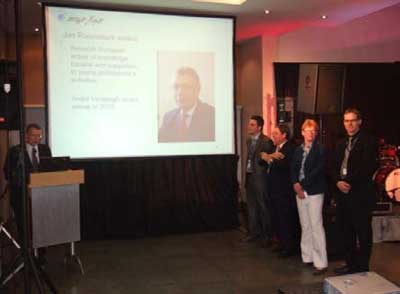
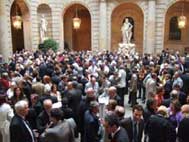 Another social event, the ENC 2010 Conference Dinner, took place on Tuesday at the splendid Casa Llotja de Mar, one of the most significant monuments in Barcelona. Built in the second half of the 14th century, it is the former headquarters of Catalan commerce near the city’s seaside.
Another social event, the ENC 2010 Conference Dinner, took place on Tuesday at the splendid Casa Llotja de Mar, one of the most significant monuments in Barcelona. Built in the second half of the 14th century, it is the former headquarters of Catalan commerce near the city’s seaside.
On the last day, the organisers made some very interesting speeches. The first session included speeches on nuclear energy development, nuclear non-proliferation and the harmonisation of EU nuclear regulations. Other fascinating presentations included one on nuclear technologies of the future, especially the right-sized reactors, presented by Mr. Sanders. The subject of the last speech was the ITER project. |
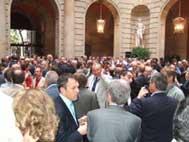 |
According to Mr. C. Alejaldre, Deputy Director-General of the Safety and Security Department of ITER, more than the half of the world´s countries are involved in this project – the most important scientific and technological enterprise ever undertaken in the nuclear field.
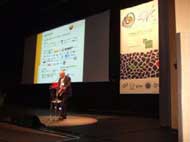 The second plenary session started with a presentation on the Sustainable Nuclear Energy Technology Platform (SNETP) by the technology platform’s Vice-Chairman, Frantisek Pazdera. He outlined the EU research and development work with regards to GEN IV reactors that is being carried out within the context of sustainable nuclear energy. At the end, ENS President, Professor Vladimir Slugen, together with ENC 2010 Chairman, the ENC 2010 Programme Committee Chairman and ENS High Scientific Council Chairman, thanked all the attendees and congratulated everyone on the success of the meeting.
The second plenary session started with a presentation on the Sustainable Nuclear Energy Technology Platform (SNETP) by the technology platform’s Vice-Chairman, Frantisek Pazdera. He outlined the EU research and development work with regards to GEN IV reactors that is being carried out within the context of sustainable nuclear energy. At the end, ENS President, Professor Vladimir Slugen, together with ENC 2010 Chairman, the ENC 2010 Programme Committee Chairman and ENS High Scientific Council Chairman, thanked all the attendees and congratulated everyone on the success of the meeting.
At the very end of the conference, Bernard Bonin, Chairman of the ENS High Scientific Council, presented some of the highlights of ENC2010 in his concluding remarks.
Finally, the overriding and strong conclusion that emerged from the conference was the fact that overall the nuclear domain is in a very healthy and lively state!
The Young Generation Network played an important role during this conference. Many speeches were given by its members. One of the most interesting parts of the conference for the young generation was the ENEN PhD event on Wednesday morning, where 8 PhD theses by graduate students from various European countries were presented. Also several posters were presented by YGN members.
At the end of this report we would like to thank ENS staff for its organisation of this great conference and for the very friendly and motivating atmosphere. Personally, as the Czech Young Generation reporter, I am also grateful for the financial support that was given to me by the West Bohemia University and by SKODA JS jsc. For my part, I would also like to thank the Spanish Young Generation (JJNN) for entrusting me with the task of being the ENC2010 conference reporter. Congratulations them for the excellent work they are doing!
Jan Blazek |
Manel M.Cid |
| |

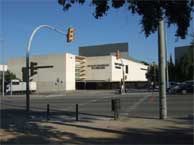 The European Nuclear Conference (ENC) 2010 was held in the Mediterranean city of Barcelona, Spain, from 30th May to 2nd June. Organised by the European Nuclear Society (ENS) in cooperation with the Spanish Nuclear Society (SNE), the International Atomic Energy Agency (IAEA) and the Nuclear Energy Agency (NEA), the event attracted more than a thousand professionals from thirty countries to the Palau de Congressos de Catalunya. ENC2010 had a multidisciplinary approach, looking at nuclear applications in energy production and medical technologies.
The European Nuclear Conference (ENC) 2010 was held in the Mediterranean city of Barcelona, Spain, from 30th May to 2nd June. Organised by the European Nuclear Society (ENS) in cooperation with the Spanish Nuclear Society (SNE), the International Atomic Energy Agency (IAEA) and the Nuclear Energy Agency (NEA), the event attracted more than a thousand professionals from thirty countries to the Palau de Congressos de Catalunya. ENC2010 had a multidisciplinary approach, looking at nuclear applications in energy production and medical technologies. 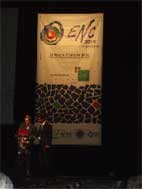 The Monday morning Opening Session took place in the auditorium. The conference Chairman began by recognising the role that nuclear energy plays as a key part of the solution to meeting increasing energy demand. Also, Mr. Andrea Brentan, the Chief Executive Officer of ENDESA, made the point that an energy mix involving nuclear energy offers a possible solution to this urgent modern problem.
The Monday morning Opening Session took place in the auditorium. The conference Chairman began by recognising the role that nuclear energy plays as a key part of the solution to meeting increasing energy demand. Also, Mr. Andrea Brentan, the Chief Executive Officer of ENDESA, made the point that an energy mix involving nuclear energy offers a possible solution to this urgent modern problem.